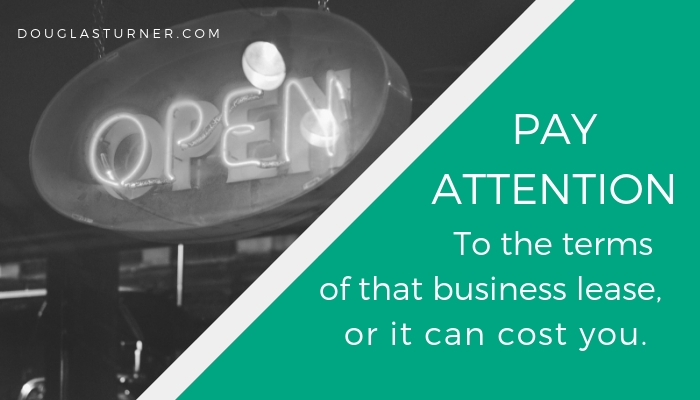Negotiating A Commercial Lease
 There is more to negotiating a Colorado commercial lease than just the cost per square foot. Should a problem arise sometime during the lease term, the commercial lease terms can be critical. The time to negotiate those commercial lease terms is before the lease begins.
There is more to negotiating a Colorado commercial lease than just the cost per square foot. Should a problem arise sometime during the lease term, the commercial lease terms can be critical. The time to negotiate those commercial lease terms is before the lease begins.
Read and Understand the Commercial Lease
This may seem obvious, but it is surprising how many people do not read the entire lease. Read and understand the lease. The commercial lease may be filled with difficult legal terms. However, a person should be able to read and understand most of the lease. In reading the lease, many people are quite surprised at the terms.
For example, we have reviewed leases that prohibit hanging pictures or driving a single nail into walls, allow landlords to arbitrarily move tenants from one space to another at the tenant’s expense and allow the landlord to declare the tenant in default and accelerate the lease payments for even the most miniscule violations.
Know Your Obligations Under the Commercial Lease
Know your obligations under the lease. The obvious obligation is the monthly lease payment, but there is much more. For example, many commercial leases require tenants to carry significant liability insurance and require the tenant to name the landlord as an additional insured. Other obligations include paying late fees in addition to interest on late lease payments, giving the landlord a first right of refusal when subletting, reporting any accidents or building defects upon discovery of those defects and promptly paying all personal property taxes.
Limit Your Part in Building Operating Expenses
Scrutinize commercial lease terms regarding building operating expenses. Building operating expenses are often passed on to tenants and prorated based upon the total space leased by the tenant. While the lease fixes a tenant’s lease rate per square foot, operating expenses fluctuate and can vary greatly year-to-year.
Many commercial leases define virtually every expense, including capital improvements, as an operating expense that may be passed on to the tenant. Consider capping or limiting the amount of operating expenses that the landlord can pass through. An experienced landlord should know what the building operating expenses will be and should be comfortable limiting annual increases in operating expenses.
Be Wary of Attorneys Fees Clauses
Look for the attorneys fees clause. Many commercial leases provide that the landlord can collect attorneys fees and costs should the tenant default on the lease. Typically, this attorneys fees clause is not a prevailing party clause – meaning that the party that prevails gets attorneys fees from the party that does not prevail. The tenant may want to suggest a prevailing party clause, removal of the attorneys fees clause, or arbitration. Further, keep in mind that the concept of who prevailed and is entitled to attorneys fees is the subject of many court cases – meaning you can think that you prevailed but the local law may say otherwise.
Review and Understand Events of Default
Many commercial leases are written so that the landlord may deem any breach by the tenant to be a default. A default may allow the landlord to accelerate all lease payments due over the entire lease term, invoke a default interest rate on amounts due and owing, charge late fees in addition to the default interest rate and collect all attorneys fees.
Know Subletting and Assignment Terms
Review subletting and assignment terms. In our experience, the landlord will provide no help in leasing the tenant’s space should the tenant need to move out. It will be up to the tenant to find a replacement tenant.
Most Colorado commercial leases will allow a tenant to sublet, but may require all profit from the sublet be paid to the landlord, impose fees for review of the proposed sublet and give the landlord a first right of refusal for the space. Combined, these terms make assignment of the lease impractical and costly for most tenants. Tenants may want to demand that all subletting expenses be considered in determining any profit from the sublet and strike the first right of refusal.
Consider Adding a Buy Out Clause to the Lease
A buyout clause is an option to allow the tenant out of the lease, for a price. Most commercial leases in Colorado do not contain a buyout clause. From a tenant’s perspective, a buyout clause is a way to determine and limit liability. While the buyout may be 6 months of rent, it provides some relief should hard times arise.


